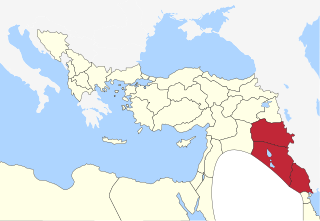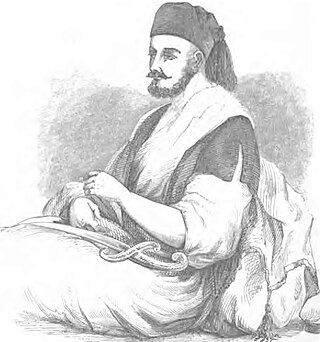Related Research Articles

Bashir Shihab II was a Lebanese emir who ruled the Emirate of Mount Lebanon in the first half of the 19th century. Born to a branch of the Shihab family which had converted from Sunni Islam, the religion of previous Shihabi emirs, he was the only Maronite ruler of the Mount Lebanon Emirate.

Ahmed Pasha al-Jazzar was the Acre-based Ottoman governor of Sidon Eyalet from 1776 until his death in 1804 and the simultaneous governor of Damascus Eyalet in 1785–1786, 1790–1795, 1798–1799, and 1803–1804. Having left his native Bosnia as a youth, he began a military career in Egypt in the service of mamluk officials, eventually becoming a chief enforcer and assassin for Ali Bey al-Kabir, Egypt's practical ruler. He gained the epithet of al-Jazzar for his deadly ambush on a group of Bedouin tribesmen in retaliation for the death of his first master in a Bedouin raid. Al-Jazzar fell out with Ali Bey in 1768 after refusing to take part in the assassination of another of his former masters. He ultimately fled to Syria, where he was tasked by the Ottomans with defending Beirut from a joint assault by the Russian Navy and Zahir al-Umar, the Acre-based ruler of northern Palestine. He eventually surrendered and entered Zahir's service before defecting from him and fleeing with stolen tax money.

The Mamluk dynasty of Mesopotamia was a dynasty of Georgian Mamluk origin which ruled over Iraq in the 18th and early 19th centuries.
Sulayman Pasha al-Azm was the governor of Sidon Eyalet (1727–33), Damascus Eyalet, and Egypt Eyalet (1739–40) under the Ottoman Empire. He belonged to the prominent Al-Azm family and was the uncle of As'ad Pasha al-Azm, who succeeded him as governor of Damascus, and Sa'deddin Pasha al-Azm, who also served as governor of Egypt.

Al-Azm family is a prominent Damascene family. Their political influence in Ottoman Syria began in the 18th century when members of the family administered Maarrat al-Nu'man and Hama. A scion of the family, Ismail Pasha al-Azm, was appointed wāli of Damascus Eyalet in 1725. Between 1725 and 1783, members of the family, including As'ad Pasha al-Azm, held power in Damascus for 47 years, in addition to periodical appointments in Sidon Eyalet, Tripoli Eyalet, Hama, Aleppo Eyalet, and Egypt Eyalet. The family's influence declined in the 19th century, failing to establish a true dynasty.

Aqil Agha al-Hasi was the strongman of northern Palestine in the mid-19th century, during Ottoman rule. He was originally a commander of Arab irregular soldiers, known as the Hawwara tribe, in the service of the Ottoman governors of Acre. His influence in the Galilee grew as he strengthened his alliances with the powerful Beni Sakhr and Anizzah tribes of Transjordan, and recruited unemployed Bedouin irregulars from Egypt into his own band of irregulars, who thenceforth became known as the Hanadi tribe. He was known by his men and Western travelers to be courageous, cunning and charismatic, all qualities that contributed to his rise as the de facto ruler of the Galilee.
Abdullah Pasha al-Azm was an Ottoman statesman who served as the governor of the Damascus Eyalet, Aleppo Eyalet (1794), Egypt Eyalet (1798), Adana Eyalet, and Rakka Eyalet (1809), before retiring to Hama in the 1810s. He was a member of the prominent political family, Al-Azm.
Uthman Pasha al-Kurji, was the Ottoman governor (wali) of Damascus Eyalet between 1760 and 1771.
Musa Agha al-Hasi was an Ottoman commander of Arab irregulars in the Galilee under governors Sulayman Pasha al-Adil and Abdullah Pasha.

Amir al-hajj was the position and title given to the commander of the annual Hajj pilgrim caravan by successive Muslim empires, from the 7th century until the 20th century. Since the Abbasid period, there were two main caravans, one departing from Damascus and the other from Cairo. Each of the two annual caravans was assigned an amir al-hajj whose main duties were securing funds and provisions for the caravan, and protecting it along the desert route to the Muslim holy cities of Mecca and Medina in the Hejaz.
Sulayman Pasha al-Adil was the Ottoman governor of Sidon Eyalet between 1805 and 1819, ruling from his Acre headquarters. He also simultaneously served as governor of Damascus Eyalet between 1810 and 1812. He was a mamluk of his predecessor, Jazzar Pasha. His rule was associated with decentralization, a reduction of Acre's military, and limits to his predecessors' cotton monopoly. Moreover, he oversaw a policy of non-interference with his deputy governors, such as Muhammad Abu-Nabbut and Mustafa Agha Barbar, and diplomacy with the autonomous sheikhs of the various Levantine regions where he held authority, including Emir Bashir Shihab II and Musa Bey Tuqan. He exercised control over his domain largely through depending on the loyalty of his deputies, who also had been mamluks of Jazzar. In effect, Sulayman Pasha presided over the world's last functioning mamluk system.
Kunj Yusuf Pasha was an Ottoman Kurd who served as the governor of Damascus Eyalet between 1807 and 1810. As governor, Kunj Yusuf enacted discriminatory policies against religious minority groups in Damascus and was unable to secure the annual Hajj pilgrim caravan to Mecca. After his inability to defeat Wahhabi invaders in 1809, he was ousted by Sulayman Pasha al-Adil with the blessing of the Ottoman imperial authorities.
The 1757 Hajj caravan raid was the plunder and massacre of the Hajj caravan of 1757 on its return to Damascus from Mecca by Bedouin tribesmen. The caravan was under the protection of an Ottoman force led by the Wali of Damascus, Husayn Pasha, and his deputy Musa Pasha, while the Bedouin were led by Qa'dan al-Fayez of the Bani Sakher tribe. An estimated 20,000 pilgrims were either killed or died of hunger or thirst as a result of the raid.
Abdullah Pasha ibn Ali was the Ottoman governor (wali) of Sidon Eyalet between May 1820 and May 1832, with a nine-month interruption in 1822–23. Like his predecessors Jazzar Pasha and Sulayman Pasha, Abdullah Pasha ruled from the port city of Acre. During his reign, all of Palestine and the Syrian coastline came under his jurisdiction. Among his major military victories was his survival of an imperial-backed siege of Acre in 1822 instigated by the Farhi family in retaliation for Abdullah's execution of his mentor Haim Farhi, the suppression of revolts in Mount Lebanon and Jerusalem in 1824 and 1826, respectively, and the 1831 capture of the Sanur fortress.
Ismail Pasha al-Azm was an Ottoman statesman who served as the governor of Damascus and amir al-hajj in 1725–1730. Prior to this post he served as the agha of Ma'arrat al-Nu'man and steadily moved up the ranks to become the governor of the districts of Ma'arrat al-Nu'man, Hama and Homs in 1719 and then governor of Tripoli in 1721 before being assigned to the Damascus governorship.
Ibrahim Pasha Qatarağasi was an Ottoman statesman who served as wali (governor) of the Aleppo, Damascus, Diyarbekir and Tripoli eyalets (provinces) in the early 19th century.
Silahdar Süleyman Pasha was the Ottoman governor of Damascus Eyalet from February 1812 to May 1816.

Mehmed Rashid Pasha was an Ottoman statesman who served as the vali (governor) of Syria Vilayet in 1866–1871 and as minister of foreign affairs of the Ottoman government in 1873–1874 and 1875 until his death. Rashid Pasha was raised in Egypt where his father was an aide of the governor Muhammad Ali and was educated in Paris before joining government service in Istanbul in 1851. There he became a protege of the grand vizier Ali Pasha, a key figure in the empire-wide Tanzimat reforms. After the latter was reappointed grand vizier in 1866, Rashid Pasha was appointed governor of the Damascus-centered Syria Vilayet which extended from Tripoli and Hama in the north to Palestine and Transjordan in the south.
Yusuf Sayfa Pasha was a chieftain and multazim in the Tripoli region who frequently served as the Ottoman beylerbey of Tripoli Eyalet between 1579 and his death.
Muhammad Sa'id Pasha Shamdin, also known as Muhammad Sa'id Agha Shamdin, was an Ottoman military official of the Syria Vilayet, best known for being the amir al-hajj for 20 years.